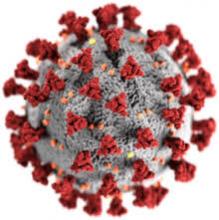
Quote of the month: “WHO's new public information video to combat the infodemic concludes with the message: 'Spend less time online'. This is a resounding recognition of the fact that simply getting people online will NOT solve the world's information problems. Far from it: connectivity gives fuel to misinformation.” Neil Pakenham-Walsh, HIFA Coordinator
Our Quote of the Month highlights one of the drivers behind the spread of misinformation about COVID-19: the Internet and the trust that many of us invest in it to provide accurate information about … well, pretty much anything. As the 'infodemic' unfolded across global media channels, conspiracy theories and myths about the disease began to proliferate. A discussion rapidly evolved on the HIFA forum and still continues, tracking the spread of this misinformation ‘infodemic’. It provides a unique, real-time snapshot of the challenges facing HIFA members who are working to banish the cancer of misinformation.
WHO has defined the term ‘infodemic’ as, “…an overabundance of information – some accurate and some not – occurring during an epidemic”. The definition sparked a debate on the HIFA forum. Dr Neil Pakenham-Walsh (HIFA Coordinator) argued that, “…there is no such thing as an abundance of accurate information that is useful to the user”, whilst Joseph Ana (HIFA member, Nigeria) questioned the validity of drawing a parallel between an infodemic and an epidemic. Chris Zielinski (HIFA member, UK) agreed. “Other characteristics of an infodemic rarely have clear parallels in an epidemic/pandemic”, he stated. Examples included, “the episodic nature of infodemic elements: while the general infodemic rages, sudden bursts of true or (more usually) false information appear (new cures, new causes, new lies)."
You can read more views and insights from HIFA members here.
During July, HIFA members were alerted to a new initiative aimed at tackling the impact of misinformation about COVID-19 in Nigeria. Chibuike Alagboso, HIFA Country Representative of the Year 2019, and his colleague Patience Adejo published a lead article for Nigeria Health Watch, focusing on public perceptions, health communication and the role of journalists. Currently, Nigerians are divided in their perceptions of COVID-19. Some regard the pandemic as a hoax, whilst others believe they are immune from infection, for a wide range of unfounded reasons. Journalists have a vital social responsibility to help inform and educate the public.
In July, an editorial in The Lancet reflected the magnitude of the misinformation challenge. “A state of affairs cannot continue where, for example, the very existence of the COVID-19 pandemic is denied”, recommending that, “… immediate, coordinated action is needed from the global political, corporate, and scientific community to maintain the integrity and credibility of professional expertise and rebuild public trust.” Responding on the HIFA forum, Neil Pakenham-Walsh welcomed the authors’ call for coordinated action:
“A holistic approach is needed for this, linking existing and new Communities of Practice at various levels. HIFA stands ready to be part of such a network of networks”.
Metrics: In July and August 2020 HIFA (English) exchanged 293 messages from 92 contributors in 24 countries (Bangladesh, Cameroon, China, Congo-Brazzaville, DR Congo, France, Germany, Ghana, India, Jordan, Kenya, Laos, Mozambique, Nigeria, South Africa, Spain, Sudan, Switzerland, Tanzania, Uganda, UK, USA, Zambia, Zimbabwe). Our top contributors were Chris Zielinski, UK (19), Joseph Ana, Nigeria (18), and Richard Fitton, UK (14). Thank you all for sharing your views and your experience.
Martin Carroll was previously Head of the International Department at the British Medical Association, London UK, and has worked on issues affecting health in LMICs since 2003. He represented the BMA on the HIFA Steering Group from 2008-16 and is now an independent HIFA Steering Group member. Martin is a member of three HIFA working groups: Multilingualism, Evaluating the Impact of Healthcare Information, and Social Media. He is also the HIFA blogger. Twitter: @MMCarroll
Picture credit: CDC/Alissa Eckert, MS; Dan Higgins, MAM. Thanks to Wikipedia

